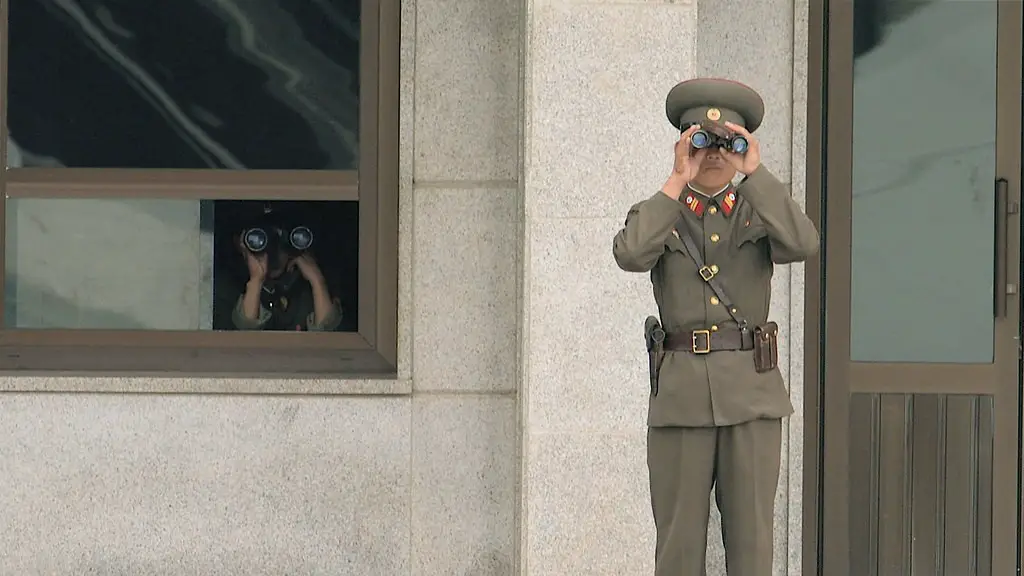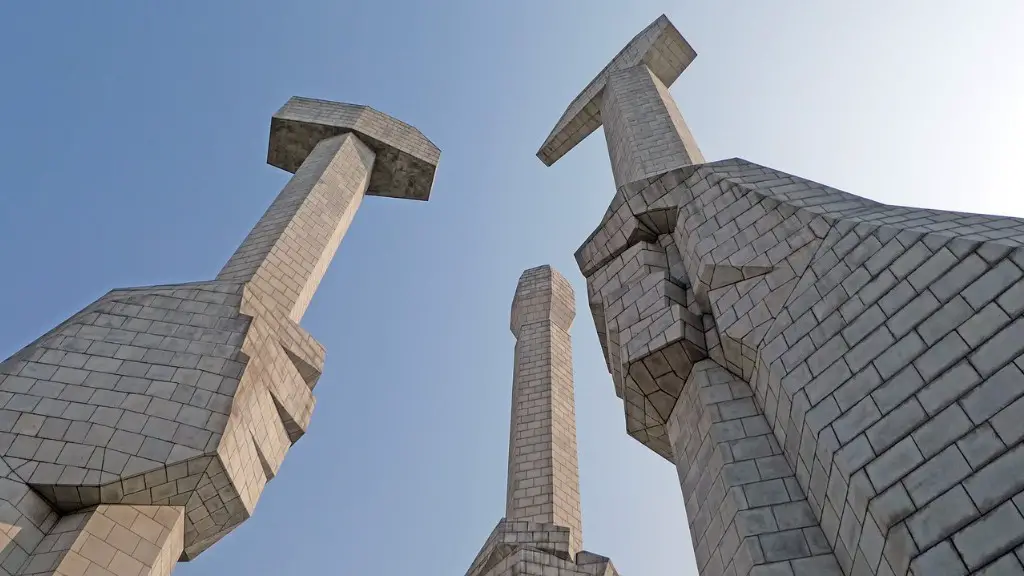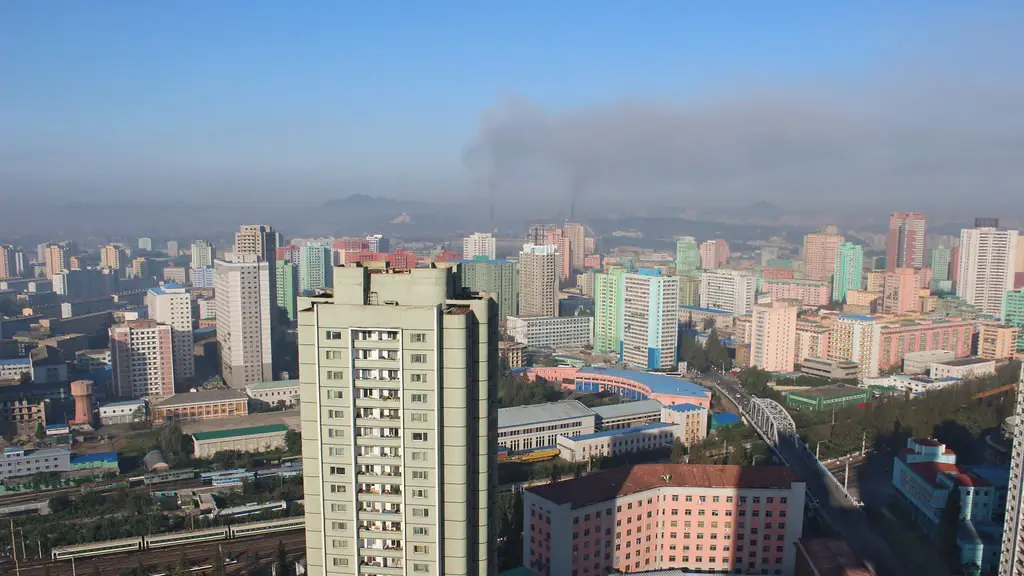North Korea declared war on South Korea in 1950 after invading the south. During the course of the war, about five million people died. It was one of the deadliest conflicts in modern history. The war has influenced international relations between the two Koreas, with tensions still high today. So when did North Korea declare war?
The Korean War began on June 25th 1950, when North Korea launched an attack against South Korea, spearheaded by the Korean People’s Army (KPA). This was the first time a communist nation had waged a war against a non-communist country, and the war would become iconic for the role it played in the Cold War.
The invasion was ordered by then North Korean leader Kim Il Sung, who was determined to reunite the two Koreas under a communist government. North Korea had received the support of their main ally, the Soviet Union, who had promised to provide supplies and military support. China also supported North Korea in the initial stages of the invasion.
Nations around the world, including the United States and the United Nations, condemned North Korea’s actions and quickly enacted sanctions. The United States organized a counter-offensive and forces from the US and other allied countries aided South Korea. The UN Security Council called on North Korea to cease the invasion and withdraw from South Korea.
The Korean War would drag on for three years, before an armistice was reached with a ceasefire in July of 1953, followed by the signing of the armistice in Panmunjom on July 27th. All sides had agreed to the armistice, which stated that there would be a “final peaceful settlement through negotiation” and a demilitarized zone of two miles between the two Koreas.
The war achieved its goal for neither side, and tensions between the two Koreas remain high to this day, with North Korea’s nuclear ambitions a constant threat to global peace. In 2018, North Korea’s leader Kim Jong Un and South Korean President Moon Jae In held a historic summit in the DMZ, which has raised hopes of peace between the two countries.
The Motive
North Korea’s invasion of South Korea had one primary goal – to unite the two Koreas by military force. North Korea had been heavily supported by China and the Soviet Union, and Kim Il Sung was determined to create a united socialist state. The war was also seen as a chance to test their military strength against the West and their allies.
North Korea was also spurred on by the actions of President Syngman Rhee of South Korea, who had threatened to invade North Korea, and had entered into the Treaty of Mutual Cooperation and Security with the United States. Both of these actions were seen as hostile acts by the North Koreans.
The tension between the two countries had been simmering for some time, with border skirmishes occurring prior to the conflict. North Korea had begun a program of infiltrating agents into the South in 1947, which had led to several clashes.
It is clear that while North Korea wanted to create a unified communist state, their decision to declare war on South Korea was heavily influenced by geopolitics and their desire to defy the West. It was a decision that would lead to one of the most devastating wars of the 20th century.
North Korea’s Capabilities
Before declaring war on South Korea, North Korea was thought to have an advantage in military capacity, although they were still widely underestimanted. North Korea had a standing army of around 170,000 soldiers, although the number surged to over 400,000 during the Korean War, with the addition of guerrilla fighters recruited from the local population.
The North Koreans were also aided by the Soviet Union and China, who supplied them with vital military equipment and supplies. The North Koreans had also enthusiastically taken up Soviet tactics and training, which gave them an advantage over the South Koreans.
On the other hand, the South Koreans initially had only a small standing army of around 95,000 and they were lightly armed. This advantage of North Korea would eventually be reversed, as the US and other allies threw their weight behind South Korea.
The United States’ Involvement
The US became militarily involved in the Korean War after the initial invasion of South Korea. President Harry Truman announced that the US would defend South Korea against any invader and fully committed troops to the cause. He called his strategy the “containment policy,” with the idea being to prevent the spread of communism in Asia.
The US forces in Korea were quickly reinforced and outnumbered the North Koreans. They also had superior air and naval power, which helped them to push back the North Koreans. US forces and their allies would eventually push the North Koreans back to the border and it would be at this point that an armistice was declared.
Consequences
The consequences of the war are still felt today. The two Koreas remain divided, with the South maintaining a close relationship with the US and other allies, while the North remains isolated and defiant. North Korea’s nuclear aspirations continue to be a concern for the international community.
The war also had immense human cost, with over three million lives lost. Starvation, poverty and forced labor were rife during the war, and many of the survivors suffered from long-term trauma and mental health issues. These scars have lasted long after the war and remain a legacy of one of the deadliest conflicts of the 20th century.
South Korea’s Response
The South Korean government reacted immediately to the North Korean invasion. They evacuated government officials to safety and declared martial law. They called on the UN for military assistance and the US quickly responded, sending troops to aid the South Korean forces.
After the war ended, the South embarked on a process of reconstruction and rehabilitation. The country was poverty-stricken and the economy had suffered heavily. The government implemented a series of reforms to revive the economy and they embarked on a program of rapid industrialization, borrowing heavily from foreign countries.
The South Koreans also approached the postwar period with a spirit of reconciliation and they sought to reunify the two Koreas peacefully. They reached out to North Korea through a series of exchanges, although these would eventually fall apart in the wake of the North’s nuclear ambitions.
International Response
The reaction by the international community to North Korea’s declaration of war was largely unified. The UN Security Council took immediate action, condemning the invasion and calling for North Korea to withdraw from South Korea. The UN also authorized a coalition of member states to intervene in the conflict if necessary.
The US and their allies also reacted strongly, with President Truman threatening military intervention if North Korea did not comply. As the war progressed, more countries became involved, including Australia, Canada, France, Belgium, the Netherlands and Thailand.
The war led to an arms race between the US and Soviet Union, with both sides developing more advanced weapons and technology. This was a major factor in escalating the Cold War, as both sides sought to gain the upper hand. It also firmly established the two Koreas as separate entities, with North Korea as a “rogue state” and South Korea as an ally of the US.
The War Today
The Korean War is still very much relevant today, despite it having ended almost 70 years ago. North Korea’s nuclear ambitions continue to be a threat to regional and global stability, and tensions remain high between the two Koreas. The 2018 summit between Kim Jong Un and Moon Jae In has been seen as a positive step, but there is still a long way to go.
It is impossible to underestimate the impact the Korean War has had on the world. Without it, there would have been no arms race and the Cold War might have taken a different course. It also has led the two Koreas down different paths, with South Korea becoming an economic powerhouse and North Korea becoming an isolated and defiant state.




